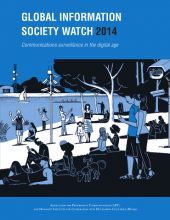2014 - Communications surveillance in the digital age

Online surveillance, security and privacy are concerns that have been central to human rights activists for years – but with the recent revelations by former National Security Agency (NSA) contractor Edward Snowden of United States (US) government spying on citizens, the issues have reached global attention.
This Global Information Society Watch tracks the state of communications surveillance in 57 countries across the world – countries as diverse as Hungary, India, Argentina, The Gambia, Lebanon and the United Kingdom. Each country report approaches the issue from a different perspective. Some analyse legal frameworks that allow surveillance, others the role of businesses in collecting data (including marketing data on children), the potential of biometrics to violate rights, or the privacy challenges when implementing a centralised universal health system. The perspectives from long-time internet activists on surveillance are also recorded.
Using the 13 International Principles on the Application of Human Rights to Communications Surveillance as a starting point, eight thematic reports frame the key issues at stake. These include discussions on what we mean by digital surveillance, the implications for a human rights agenda on surveillance, the “Five Eyes” inter-government surveillance network led by the US, cyber security, and the role of intermediaries.
These reports are published at a critical time: they show how rampant government surveillance is across the world, and how business is often complicit in this. They suggest action steps that civil society can take to push for a human rights framework for internet governance – and to expose what until now has remained hidden.
GISWatch is published annually and is a joint initiative by the Association for Progressive Communications (APC) and the Humanist Institute for Development Cooperation (Hivos).
| Attachment | आकार |
|---|---|
| Global Information Society Watch 2014 | 4.7 MB |